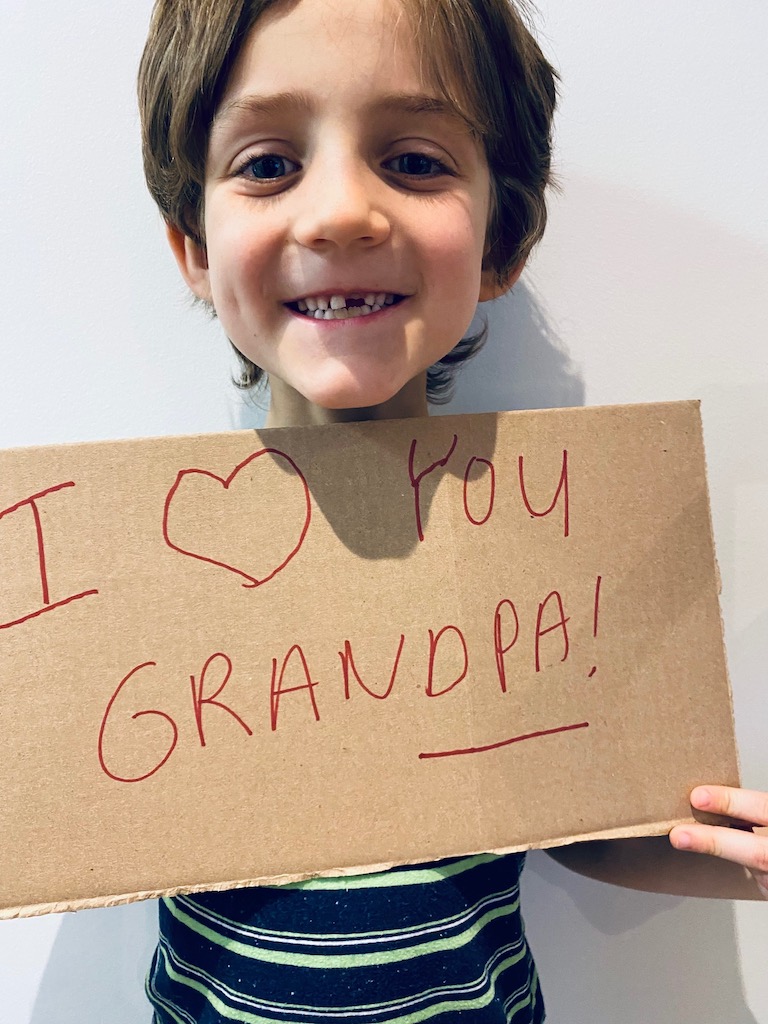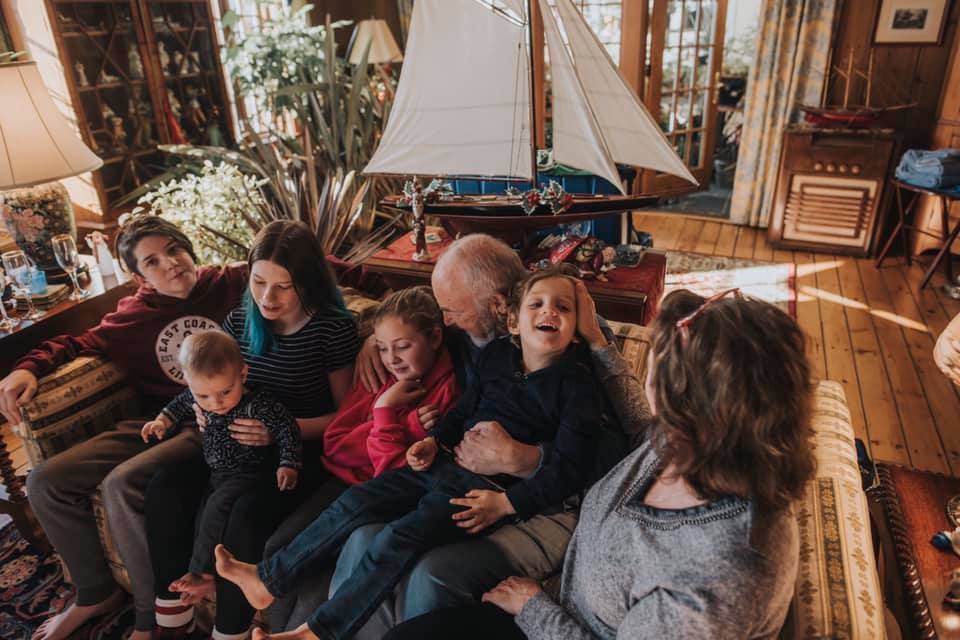Grandparenting from a distance
With many grandkids living outside of Singapore, it can be tough staying connected on a regular basis. And with the pandemic, things couldn’t get tougher.
Grandparenting can be tough especially when grandchildren are living outside of Singapore. How do relationships continue to grow and new memories made over the phone or even through Zoom? Furthermore with the pandemic, it has put a further strain on grandparents who have not seen their grandchildren for a while.

Dr Kerry Byrne.
Ageless Online talks to Dr Kerry Byrne, founder of The Long Distance Grandparent, a support network for long distance grandparents that is based in Canada, on her initiative and tips on how grandparents can stay connected regularly:
What motivated you to start The Long Distance Grandparent?
As a research scientist in the area of ageing, care and relationships for over 20 years, I’ve always known connecting generations in meaningful ways is important.
But when I became a mother, and was faced with making sure my own children were connected to their grandparents – all who live at a distance – I began to see how possible it was to nurture strong bonds between them from a distance.
I was officially curious and when I looked into the research, there were few solutions specifically aimed at long distance grandparents. Yet, it was clear grandparents were worried they wouldn’t be able to bond with grandchildren from a distance. From my own experience, I knew it could be done but also knew it required intention and extra effort from both the parents and grandparents to make it happen.
I decided to start The Long Distance Grandparent as a free weekly newsletter, which I still send out – to see if there was an interest in the topic. When the pandemic hit, I heard from hundreds of grandparents who were looking for ways to stay connected, so I launched The Long Distance Grandparent Society as a way to provide this missing support for grandparents.
Tell me more.
The Long Distance Grandparent Society is an online monthly membership designed with and for long distance grandparents who have grandchildren aged two to 10. I describe it as a digital subscription box because the entire membership is delivered virtually and through digital products.
We have grandparents from all over the world participating – and grandparents with grandchildren who live all over the world. Because it’s digital and the meetings are virtual, grandparents can participate and benefit no matter where they live.
Each month, they receive a Connection Pack based on themes of importance to strengthening relationships. It’s filled with snail mail to send grandchildren, designed based on the research about everything from child development to the science of connection. The mail is aimed at prompting connection and ensuring they get to know one another from a distance. They also receive virtual grand date ideas. Games to play and questions to ask that result in meaningful conversations and interactions.
In addition, I host Grand Zoom Chats each month for grandparents to gather and support each other through the ups and downs of grandparenting. Finally, each month I bring in a guest expert about topics relevant to long distance grandparenting such as coping with the grief, using photos or stories to connect, the importance of humour and play – and also researchers and authors writing about grandparenting.
We have a phenomenal group of grandparents, all supporting one another. The truth is, grandparenting from a distance can be tough emotionally. Much like parents connect and network around parenting, the membership provides a way for grandparents to be intentional about their role and learn from other grandparents – and to try new and unique ideas with grandchildren so they can have the strongest and most meaningful relationships possible.
Grandparenting was hard before COVID where many grandparents, particularly those living in Singapore, have grandkids living overseas but they still got to travel once in a while. But then COVID hit. How has this made it even harder for long distance grandparents?
The pandemic has absolutely made it tougher emotionally for families who live at a distance. Planning in-person visits is often what gets us all through the distance and with the uncertainty, and for many, the impossibility of visits, it has added a level of grief for grandparents – and also for the parents and grandchildren. I’m noticing a lot more grief about the loss of time and connection. When you are older you experience time differently and have an acute awareness of how fleeting it can be.
 How can grandparents not let distance get in the way and make every connection count as you have said on your website? Can you share some tips on building meaningful relationships from a distance?
How can grandparents not let distance get in the way and make every connection count as you have said on your website? Can you share some tips on building meaningful relationships from a distance?
The best way to have meaningful connections is to keep up with what your grandchildren are interested in and care about. For children, this changes often. The research highlights that not knowing what grandchildren are interested in is a barrier to connection. But there are so many ways to find out this information and keep notes about it. I call this ‘sweat the small stuff’ and what I mean is to remember the small details about their lives, such as their teacher’s name, their friends’ names and what they like or don’t like to eat.
When I was younger, I had an aunt who always remembered that I don’t like pumpkin pie on Thanksgiving. She would get me my own sugar pie and I remember feeling special because she remembered this small detail about me.
If you know the name of their soccer coach and can say did Coach James make you work really hard today? It signals to your grandchild that you are listening and care about the things they care about. I encourage grandparents to write these things down in a notebook and keep them close to wherever they video chat with grandchildren. You can find out this information during video chats with them by asking questions or playing games that result in them sharing this kind of information. For instance, play a game of Mad Minute Favourites – set a timer for one minute, and rapid fire questions at them about their favourites. You can ask, what’s your favourite animal, colour, vegetable, fruit, game, book, etc, and take notes. If you find out they love elephants, you can find some fun facts about elephants and create a quiz for them about elephants or send a book or a joke about elephants. And then send it in the mail and ask them to call you for the answers. Or if you find out they love the colour red, send something in the mail in a red envelope and make everything inside red (for example, red stickers, pipe cleaners, mini cars, etc).
Take a picture of the mail beforehand, or a video of you walking to the postbox and tell them to watch out for their Red Mail and to call you when they receive it. This creates anticipation and links the mail you send to your video calls. Make sure you reference back to what they told you about their favourite colour being red. This sends a strong message – I’m listening and I care about the things you care about.
Are postcards every month something that both parties can do?
Postcards are a wonderful way to connect. Using photos of you together – or screenshots of your video chats, make wonderful postcards for kids. Describe the moment you shared and how much you loved seeing their smile or hearing them laugh. It reminds them of your time together and the special moments you do share – even if these moments don’t happen as often as you would like them to.
But I encourage sending any kind of snail mail, no matter how long it takes to get there. Grandparents are often the only people in a child’s life who sends them what my own grandfather used to called ‘real mail’. Not flyers, but actual mail addressed to them. Include a few stickers, kid Band Aids or a special writing pen for older grandchildren to make the mail fun for them to open – and look forward to receiving.
It sounds like two parties need to be committed, but things do happen. People get busy and they forget. What advice would you give to keep it going?
I recommend two strategies for grandparents as well as parents. First, if you can, schedule a weekly call on a weekend morning or evening to spend time together. It doesn’t have to be long, and both parties need to know that sometimes the kids will just run around and not feel like engaging – and that’s completely okay. As adults, sometimes we feel like chatting and sometimes we don’t. Kids are the same. Don’t take it personally and let the parents know it’s okay if the kids just run around like a tornado. Parents sometimes feel badly if the kids don’t want to chat or sit still!
If someone can’t make it one week, everyone needs to understand. But if you have a standing time to chat, then the in-between spontaneous connections are added. For parents, give the children a snack while video chatting with grandchildren. I use popcorn or popsicles – something they must sit still to eat because this gives us at least a few minutes to chat. It really helps.
Second, as grandparents, you can use the five-minute chat technique. Text and say, can we chat with the kids for five minutes? And then stick to it. Set a timer and say you have a game that will take five minutes to play. Games like memory tray or five seconds (name five things in a certain category in five seconds such as five animals, countries, etc) are quick and engaging. For little ones, asking something as simple as guess what I have behind my back or in my right hand and then giving them clues about what it is for them to guess, works well. They will likely want to do it back to you. Kids love guessing games!
Grandparents here may however find it difficult as some may not know how to use the computer but rather the phone. How can this group still get connected to their grandkids in a meaningful way?
Phone calls can be really challenging because you lose the ability to read their body language and to engage in more interactive ways.
If it’s the only mode of communication you have available to you, I suggest keeping the calls short, just a few minutes long. Kids are sometimes reticent to get on the phone because they are unsure what to talk about or they think it will be a long conversation and take them away from whatever they are doing. The goal is to make sure the calls are short and fun.
You can do this by preparing a few interesting questions related to things they are interested in right now. For instance, if they are really into a certain sport, ask them what are two things you love the most about soccer? If you have access to the Internet, look up a quiz about the topic and make up a set of questions you can ask in true or false style. Or use questions in an interesting way, such as would you rather play with dinosaurs or cars all day? Be invisible for a day or be able to fly for a day? That we go to an art museum or a science centre next time we get to be together?
The possibilities are endless but these question structures (i.e., would you rather or true/false) can be applied to a lot of different topics depending on the age and interests of your grandchildren. Once they know you will have some interesting things to chat about and that you will keep the calls short, they will be more likely to say okay, let’s call grandma.
I will say though that video chatting is much better than the telephone, especially for younger children. There are groups like Getsetup.io that are geared to adults 50 plus and they teach you how to use technology like Zoom to stay connected to family.
 What about language issues? Or, dementia being an issue. How can grandparents still connect?
What about language issues? Or, dementia being an issue. How can grandparents still connect?
For language, hearing impairment or dementia, asynchronous approaches can really help – which means communicating but not in real time. Marco Polo is a free video chat application where you can share videos back and forth, but not in real time. It’s great for time differences too because people can respond when it works for them. For those who have communication challenges related to hearing impairments, language differences or dementia, there is time to have a partner explain what is being said in the video and then to respond accordingly.
I encourage grandparents who speak a different language to their grandchildren to use this to connect. You can have them teach you some key phrases or greetings or learn a few key phrases in their language such as I love you and I miss you, and include them in the mail you send or during video chats. You don’t have to write an entire letter in the language, just a few short greetings or phrases. My son knows two sentences in Gaelic and he and my dad will start their conversations with it. It’s a source of pride for both.
Word Hippo has a great translation feature that allows you to see how something is written in a different language and to hear it so you can memorise it and use it in your chats.
Is it sometimes harder for grandfathers to connect than grandmothers?
What I’ve noticed in my work with grandparents is that grandfathers can take a little longer to buy into the notion that you can indeed ‘play together’ on video chats. But once they do, they love it and have great success. I also think it depends on the person – if you are motivated to find ways to connect, I don’t think it matters if you are a grandmother or grandfather – both can do it with a little outside of the box thinking.
Let’s talk about when the grandkids do make it to Singapore and they connect after many years (as here they are encouraging those older not to travel). What things can they do to have lasting connections so that when the grandkids leave it can continue?
In-person visits provide a springboard for future video chats. When you are visiting, be sure to get in the photos and the videos so you can print them out afterwards and use them as postcards to send to your grandchildren.
When you are together, use that time to find out how they like to communicate. For older grandchildren, they might like to text. Get their mobile numbers into your phone and send an encouraging text weekly. Besides savouring every moment you have together, think of yourself as a bit of a grand detective while you are there. What books are they reading? Perhaps they no longer like board books, or you think they love dinosaurs but they have clearly outgrown this obsession. Using this time to really be in tune to the small details will help you in the coming months to make your interactions more meaningful and fun for your grandchildren.
Also, leave behind sweet notes in their pockets or even their shoes reminding them how much you love them, or leave behind a few envelopes with the parents that have some fun crafting items for you to do together on a video chat once they return home.
You are a mom of two and I understand grandparents are living a distance. And that you believe children need their grandparents, now more than ever – no matter the distance between. What have you done to make this possible?
We have experienced ultra-long distance when living in Dubai and now that we are back in Canada, we are still at a distance from all the grandparents. We have grandparents in England and also across Canada. The closest grandparents are still a five-hour drive away. As parents, we make sure to bring the grandparents into everyday conversations, share stories about the time they have spent with their grandparents, and also we make sure we have photos of the grandparents around the house so we can talk about them.
Anything else you would like to add?
It can be frustrating for grandparents when they don’t get much back in terms of hearing from their grandchildren, but I encourage grandparents to keep trying – change it up and whenever you can surprise and delight your grandchildren. I also think that grandparenting from a distance requires a lot of behind the scenes work for grandparents, such as preparing for video chats. Having a few games in mind prepared can go a long way so that when you get on the video chat you are not just saying ‘so how is school’. It takes more effort to grandparent from a distance. For more ideas and to sign-up for my weekly e-mails, you can go to www.thelongdistancegrandparent.com.
(** PHOTO CREDITS: The Long Distance Grandparent)

0 Comments